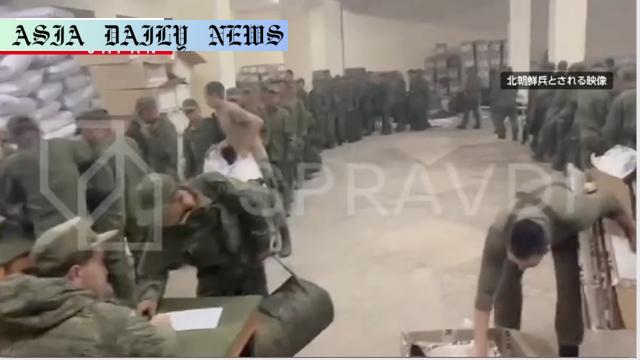North Korea Troops – The South Korean military reports on North Korea’s heightened support to Russia, including troops and military equipment.
North Korea sent 3,000 more troops to Russia early this year.
Provided military equipment includes missiles, howitzers, and launchers.
About 4,000 North Korea soldiers died or were injured last year.
North Korea sought Russian help for satellite upgrades after a failed attempt.
Landmine incidents and casualties were observed near the North Korean border recently.

North Korea’s Increasing Support for Russia
In a sobering revelation, South Korea’s Joint Chiefs of Staff (JCS) reported that North Korea dispatched approximately 3,000 additional troops to Russia in January and February of 2023. This decision is allegedly tied to their support for Russia’s ongoing military activities in Ukraine. The move underscores the growing synergy between the two nations, signaling a concerning alliance that bolsters Russia’s military manpower and resources as it continues its invasion.
The contributions to Russia by North Korea are not limited to just troops. The report details that substantial military equipment has also been transferred. This includes short-range ballistic missiles, approximately 220 self-propelled howitzers, and rocket launchers, further escalating military concerns. Analysts speculate that such transfers might reflect Pyongyang’s tacit goal of advancing its technological capabilities through Russian-based partnerships and expertise.
Impact of North Korean Military Losses
According to the findings, during 2022, North Korea sent nearly 11,000 soldiers to Russia, with around 4,000 sustaining injuries or fatalities. Such staggering losses raise questions about the North Korean regime’s prioritization of external alliances over its domestic stability and troops’ welfare. These developments highlight the extent of North Korea’s commitment to supporting Russian aggression, despite its domestic challenges, like economic stagnation and resource scarcity.
While the immediate effects of the North Korea-Russia military relationship are regional, they hold broader implications for global security dynamics. Observers warn that such cooperation not only strengthens Russian aggression but also perpetuates Pyongyang’s militarization while undermining international efforts targeting peace and stability in the Korean Peninsula and beyond.
Collaborations on Technological Advancements
Among other alarming revelations, the JCS noted that North Korea is seeking technological upgrades to its reconnaissance satellites, potentially with Russian help. This follows a failed launch attempt in May 2022. Although no immediate launch is apparent, the collaboration could lead to significant advancements in North Korea’s surveillance and military intelligence capabilities, raising fresh global concerns. Such collaborations could trigger new cycles of escalation in the arms race in the region, further destabilizing East Asia.
The shared assistance reflects the expanding framework of cooperation between Moscow and Pyongyang, which is now extending beyond traditional arms deals to encompass sophisticated technological domains. This growing relationship emerges as a critical point of concern for international regulators and military forces, as the alliance could pivot regional power balances.
Risks Near the Korean Border
The report also mentioned heightened tension along the North Korean border. Landmine explosions have been observed as North Korean troops were reinforcing barbed wire fencing. Multiple incidents resulted in fatalities, further complicating an already volatile boundary situation. This escalation reinforces growing fears regarding the militarization strategies of North Korea, which continue to destabilize bilateral relations with its neighbors.
With regional security already a matter of significant global concern, such incidents demonstrate the lengths to which North Korea is willing to go to assert its regime’s sovereignty. Reinforced barbed wire fencing coupled with the deployment of landmines suggests a heightened sense of defensiveness but also showcases the fragility of peace in the region.
Conclusion
The reinforcement of Russian war efforts by North Korea through soldiers and arms highlights a worrying collaboration between two nations with existing tensions against the global community. This partnership not only underscores their mutual interests but also brings to light complex ramifications for world security. Moreover, technological-sharing agreements related to satellites could tilt the balance in destabilizing ways that challenge international peace agreements.
As the international community assesses these developments closely, it is evident that comprehensive strategies must be enacted to address North Korea’s growing military collaboration with Russia, ensuring such alliances do not embolden aggression further or undermine global stability.
Commentary
A Dangerous Alignment Between North Korea and Russia
The growing military partnership between North Korea and Russia is a development that cannot be taken lightly. With reports revealing that Pyongyang has sent thousands of troops to support Russia’s invasion of Ukraine, it becomes evident that this alliance is not just a matter of convenience but a calculated move with significant strategic implications. For Russia, this provides a much-needed boost to its manpower and military hardware, whereas North Korea gains an invaluable opportunity for technological advancement and political relevance.
Implications for Global Peace and Security
This coalition has far-reaching consequences that extend beyond the direct conflict zones. Militarily, the transfer of arms and soldiers tips the scales in favor of prolonged aggression, while diplomatically, it stresses already fragile international relationships. North Korea’s involvement could embolden other nations with authoritarian tendencies to act out, knowing such alarming alliances could set a precedent. These developments not only destabilize regions like East Asia but could also reframe global power structures, pushing nations to rethink policies and defense networks.
The Role of the International Community
The international community needs to act decisively. Strong sanctions, dialogues, and defensive strategies are essential to curb the implications of such military collaborations. Engaging countries like China and other regional players in coordinated measures would be crucial, as they hold influence over both North Korea and Russia. By tightening global alliances and reaffirming geopolitical consensus against unauthorized militarization, steps can be taken to de-escalate tensions while safeguarding democratic principles and human security.
Ultimately, this alliance between North Korea and Russia represents yet another challenge to the international framework for security and peace. However, with insightful policies and collective efforts, the threat can be mitigated, albeit with cautious optimism that global players work in unity.


